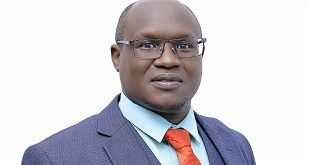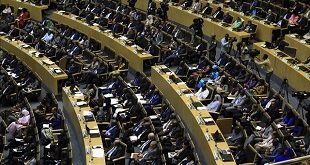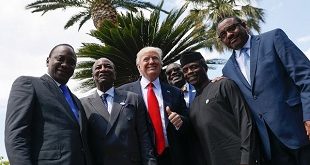
By Andrew M. Mwenda
Since her return to Rwanda as a presidential candidate, Victoire Umuhoza Ingabire has animated media interest. The main issue in her campaign is her claim that ‘those who killed the Hutu in the 1994 genocide have not been tried.’ This is another way of saying the Rwanda Patriotic Front (read the Tutsi) is guilty of genocide against the Hutu.

Many people expected Ingabire to be arrested. She has not, at least not yet. Ingabire is good analytically for those interested in African politics. Her claims have formed a decade-long academic obsession by scholars on Rwanda most of whom are either French or enjoyed close links to the government of the late Juvenal Habyarimana.
Ingabire’s main campaign theme demonstrates the major challenges African nations face in seeking to establish democratic systems. In the West, elites share an agreement on basic national values; there is a political culture built around shared beliefs that define the terms and scope of political discourse. Electoral campaigns are therefore guided by what is accepted as legitimate debate and what is not.
I currently live in the world’s leading democracy, the United States of America. Here, the terms of the debate are clear, violation of which generates strong societal sanctions. In the last campaigns, Barack Obama’s pastor, Jeremiah Wright, made remarks considered injurious to the national consensus. There was broad-based condemnation of Wright’s claims that forced Obama to disown him. Equally, if a politician in America denied the Jewish Holocaust; it would be their last day in politics. Every political party would denounce them; mainstream media would shun them, and most civic associations would follow suit.
Political elites in Africa lack these shared national values that define the nature and scope of political discourse. This partly explains why electoral competition degenerates into violence; victory is seen as a defeat of one group by another; not a triumph of one idea over another. Yet it is in our immature nations with less educated electorates where democracy demands a lot of responsibility from our leaders.
Were there Hutu civilians who died at the hands of the RPF in 1994? I think so. But this was never RPF’s official policy. Any soldier who killed innocent civilians was punished. Are there some who for some reason were not punished? Very likely! However, the broader point should not be ignored: RPF ended genocide in Rwanda. It became the moral conscience of the country in its moment of national catastrophe.
During the Second World War, it was the official policy of the Western allies to bomb centres of German civilisation and civilian settlement. Estimates suggest that more than four million German civilians were killed. Now just imagine a presidential campaign in Germany, UK or USA in 1960 where a candidate was saying: ‘Winston Churchill and Franklin Roosevelt should be alongside Enrick Himmler and Herman Goering at Nuremburg for trial.’ That candidate’s career would just die.
It is unacceptable to attempt to create moral equivalence of the crimes of the Nazis with those who saved Western civilisation from fascism. Churchill and Roosevelt, whatever their acts or omissions cannot be put in the same dock with Adolf Hitler and Benito Mussolini. Scholars like Gerald Punier and my own friend Prof. Rene Lermachand who argue genocide of the Tutsi against Hutu cannot make a similar argument in regard to Churchill and Roosevelt.
On 9/11, America lost 3,000 people at the hands of Al-Qaeda. In response, the US invaded Afghanistan and later Iraq to fight a ‘war on terror’. Thousands of Iraqi and Afghanistan civilians have died in air raids. However, a politician in the US cannot last one day in politics if ‘ on this basis ‘ he equated George Bush to Osama bin Laden.
Therefore, for a presidential candidate in Rwanda to say those who ended genocide should share the dock with those who orchestrated it; that victims of genocide should be tried alongside its architects, is irresponsible, insensitive and not worth being a leader. Whatever their mistakes and miscalculations, the RPF sought to end genocide ‘ just like the UK and US during the Second World War sought to defeat fascism.
Rwanda today faces a great opportunity of deepening its democracy and of expanding its spheres of free expression. But it equally confronts a challenge of how to pursue this vision without igniting the forces of ethnic polarisation that contributed with such vengeance to the fragmentation of society and allowed evil to almost dismember it.
Ingabire stands at an historical moment to assist the process of democratisation in Rwanda. This requires the ability to appreciate the fragility of the political settlement in the country. She needs to reassure those who feel endangered ethnically that there can be debate without stoking the fires of hatred. Even if she were to become ‘the’ legitimate voice of opposition in Rwanda, her claims show that she lacks the strategic foresight to help consolidate the platform for free expression in that country.
Given the emotive power of ethnicity especially in Rwanda, it is easy to rally a political following by making ethnic claims. But it is also extremely dangerous. Those who desire to see growth of a strong and viable opposition in Rwanda need to be cognisant of this fact. But if the opposition that grows focuses on scaring those who hold the instruments of control, we can say kwaheri to the democratic experiment.
Rwandans have strong and burning policy issues to battle today ‘ on economic growth, infrastructure, health, education, agriculture, industry, services, urban planning, corruption, housing, the quality and effectiveness of institutions of government ‘ the list is endless. It seems that opposition politicians in Africa often lack the ability to offer a real alternative to incumbent regimes at the level of public policy. This possibly explains why they retreat to identity claims to secure political support.
Sadly for Ingabire, many countries in Africa can afford ethnic politics. Rwanda cannot. In ignoring the lessons of history, she is actually undermining the very process that allowed her to return home. Hopefully, the people of Rwanda will have the wisdom to look at the content of a candidate’s policy proposals not their ethnicity in making electoral choices.
amwenda@independent.co.ug
 The Independent Uganda: You get the Truth we Pay the Price
The Independent Uganda: You get the Truth we Pay the Price


